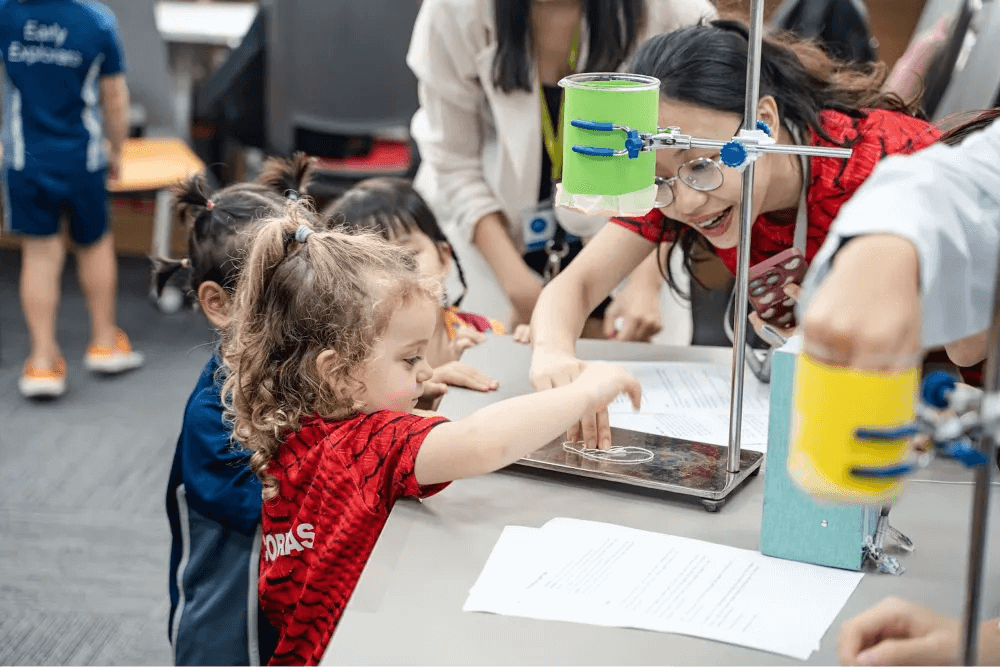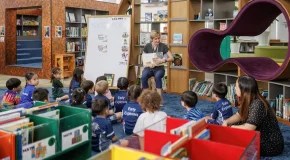Top 7 Current Trends in Early Childhood Education
Staying current with trends in early childhood education helps educators, parents, and stakeholders foster optimal learning environments for young children. Our article will inform readers about the latest developments in this field, ensuring that all parties are well-equipped to support the next generation.
The discussion will cover 7 key trends that are transforming the field:
- Child-centered learning method
- Nature-Based School Program
- Social, emotional learning
- Game-based learning
- Integrating AI (Artificial Intelligence) & Technology in the classroom
- Distance and blended learning
- STEM/STEAM education
These diverse early childhood trends cover various aspects of education, from mental health to technology integration. Let’s delve in!
1. Child-centered Learning Method
The child-centered learning method, which reflects the latest trends in early childhood education, encourages children to participate actively in their learning journey through hands-on experiences.
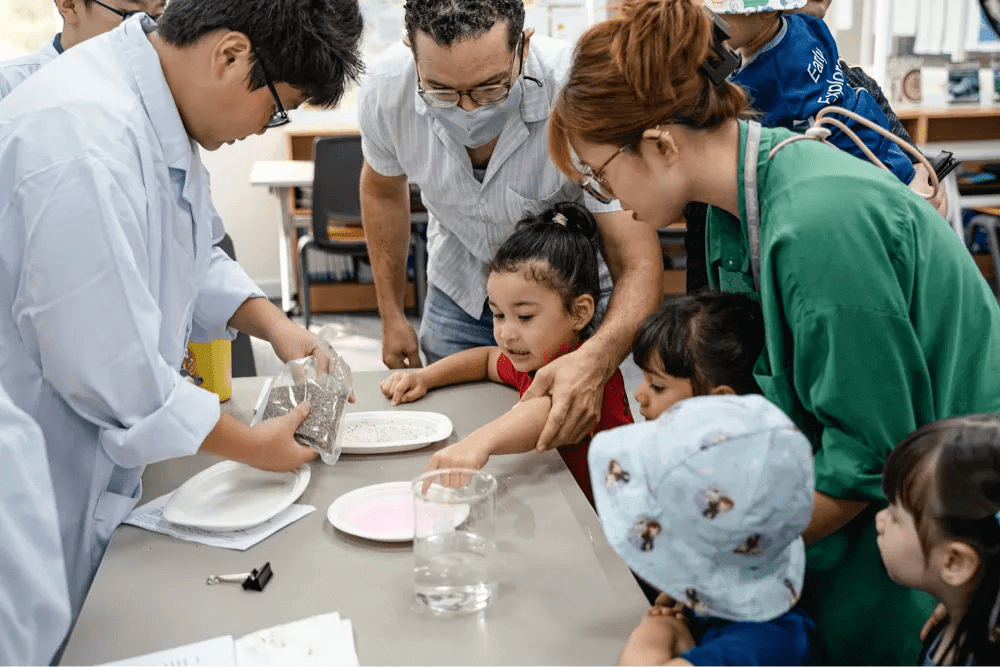
Benefits of Child-Centered Learning Method
Child-centered instruction has numerous benefits for academic and personal development.
- Social and Emotional Development: Children develop essential social skills and emotional intelligence by engaging with peers and participating in collaborative activities.
- Enhanced Executive Function Skills: Activities that require planning, decision-making, and problem-solving help children improve their executive function skills.
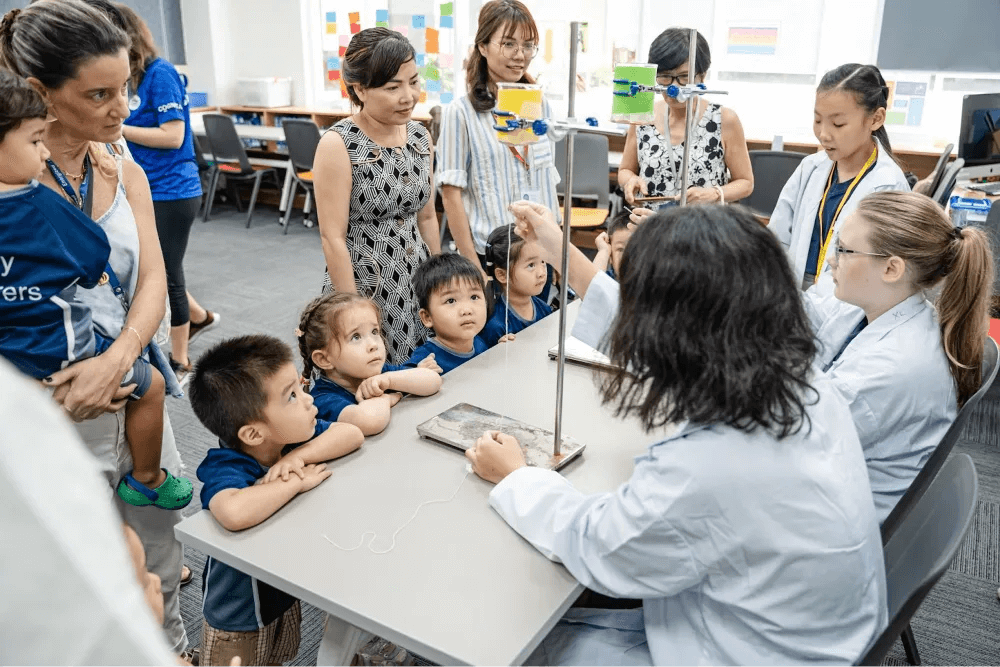
How to Apply Child-Centered Learning Method:
- Customized Learning Plans: Develop personalized learning plans based on continuous assessments and observations to address each child’s unique needs, interests, and learning styles.
2. Nature-Based School Program
From traditional classroom settings to nature-based school programs, this innovative approach to early childhood education, aligning with the current trends in early childhood education, immerses children in outdoor environments, integrating nature into every aspect of their learning experience.

Benefits of Nature-Based School Program
- Enhanced Physical Health: Regular outdoor activities contribute significantly to children’s physical development and overall health, promoting better mood and well-being
- Emotional Well-being: Time spent in nature reduces stress and promotes happiness, contributing to better emotional health and social development.
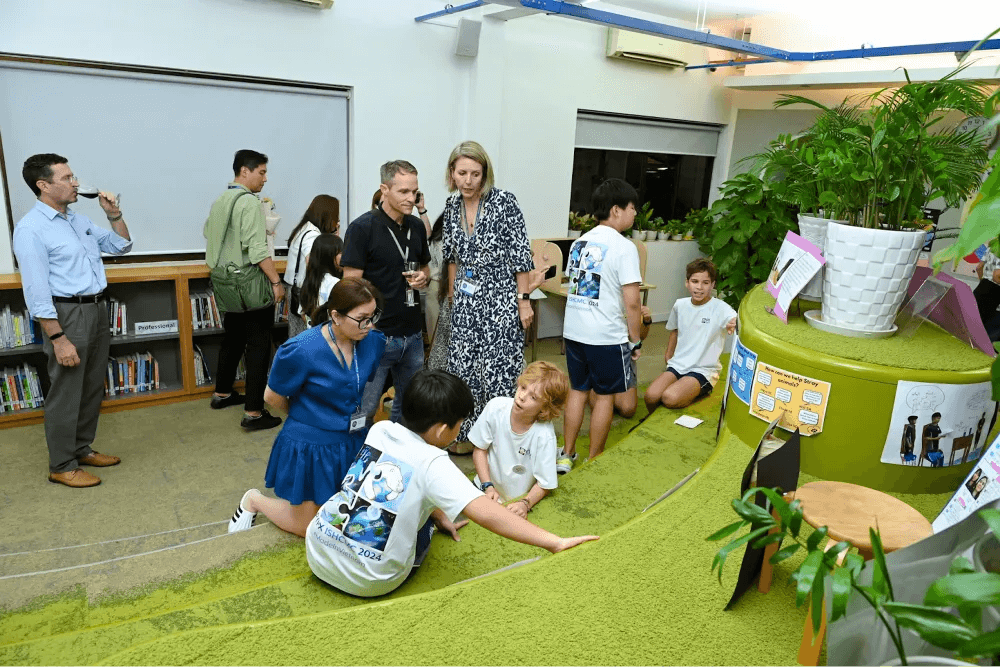
How to Apply Nature-Based School Program
- Outdoor Learning Spaces: Create dedicated outdoor classrooms with built-in learning areas such as garden beds, water exploration troughs, and sensory bins for hands-on learning and exploration.
3. Social-Emotional Learning
Social-emotional learning (SEL) teaches children to understand and manage their emotions, build positive relationships, and make responsible decisions. These are key components of the current trends in early childhood education.

Benefits of Social-Emotional Learning
- Enhanced Emotional Well-being: SEL provides a foundation for emotional well-being and mental health by teaching children to recognize and regulate their emotions, cope with stress, build resilience, and develop a positive self-image.
- Improved Social Skills: Children with SEL instruction exhibit better social behaviors, forming healthy and supportive relationships with peers and adults, communicating effectively, resolving conflicts, and collaborating with others.

How to Apply Social-Emotional Learning
- Group Activities: Organize group activities that foster teamwork, collaboration, and empathy, helping children to understand and respect others’ perspectives.
4. Game-Based Learning
Incorporating game-based learning from the latest trends in early childhood education represents a dynamic approach to engaging young learners, making learning effective and enjoyable.

Benefits of Game-Based Learning
- Cognitive Growth: Games that challenge problem-solving skills and critical thinking contribute to cognitive development, enhancing memory, creativity, and complex thinking abilities.
- Development of Social Skills: Playing games in a group setting helps children develop essential social skills, such as cooperation, turn-taking, negotiation, and conflict resolution, which are crucial for their social development.

How to Apply Game-Based Learning
- Integrate Games into Curriculum: Develop curriculum activities that incorporate games to reinforce academic concepts, such as math or language skills, through interactive and enjoyable methods.
5. Integrating AI (Artificial Intelligence) & Technology in the Classroom
Utilizing Artificial Intelligence (AI) and various technological tools in the classroom reflects current trends in early childhood education, offering innovative ways to enhance learning experiences.
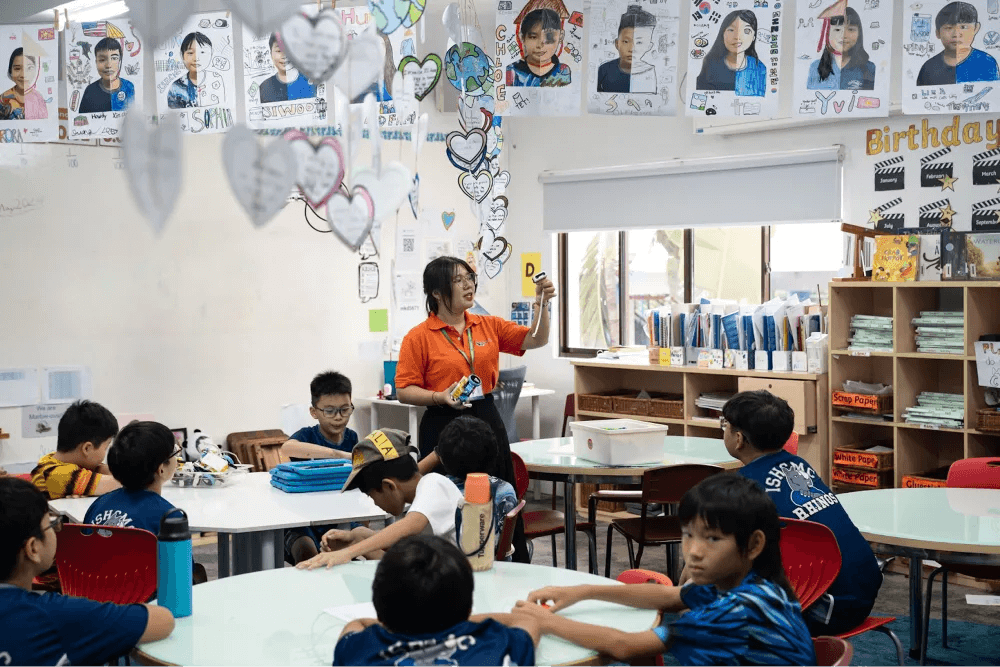
Benefits of Integrating AI & Technology in the Classroom
- Improved Engagement: Technology, including interactive apps and educational software, captivates children’s attention and motivates them to participate actively in learning activities, making lessons more engaging and interactive.
- Personalized Learning: Adaptive learning platforms and AI-driven tools can tailor educational content to meet individual students’ needs, providing customized lesson plans and real-time feedback.
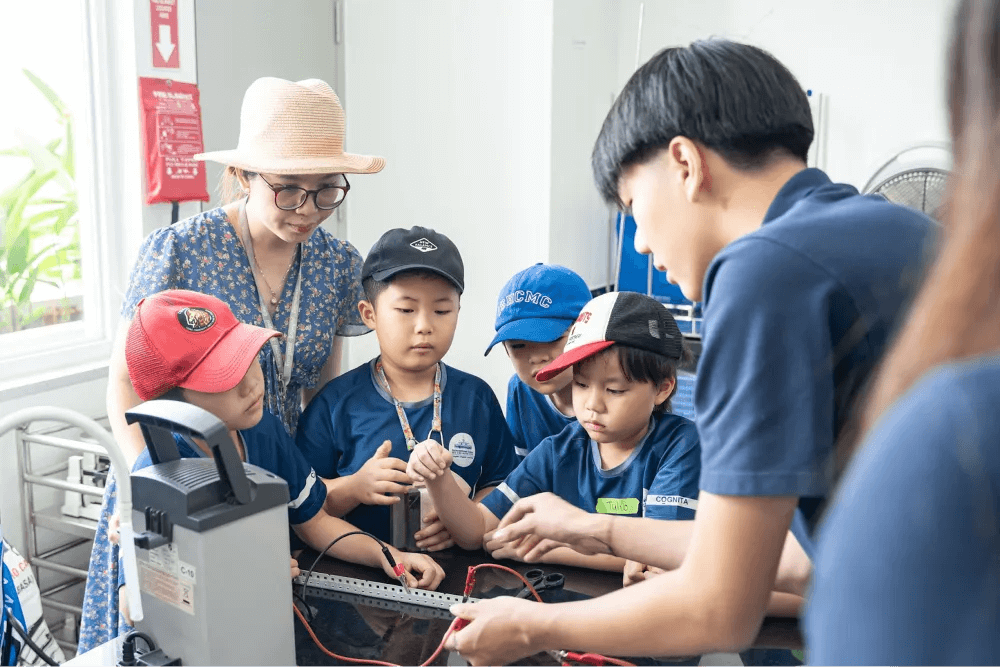
How to Apply AI & Technology in the Classroom
- Utilize Interactive Whiteboards: Incorporate large display boards for various activities, including playing educational videos, conducting virtual field trips, and engaging with interactive software.
6. Distance and Blended Learning
Distance and blended learning combine online learning with in-person interactions, aligning with the latest trends in early childhood education to cater to diverse educational needs and learning styles.

Benefits of Distance and Blended Learning
- Flexibility and Accessibility: Distance learning provides access to educational resources from any location, while blended learning offers a mix of online and face-to-face interactions, providing flexibility while maintaining personal engagement.
- Enhanced Access to Resources: Students can benefit from interactive online materials, virtual field trips, and educational apps that supplement traditional classroom activities
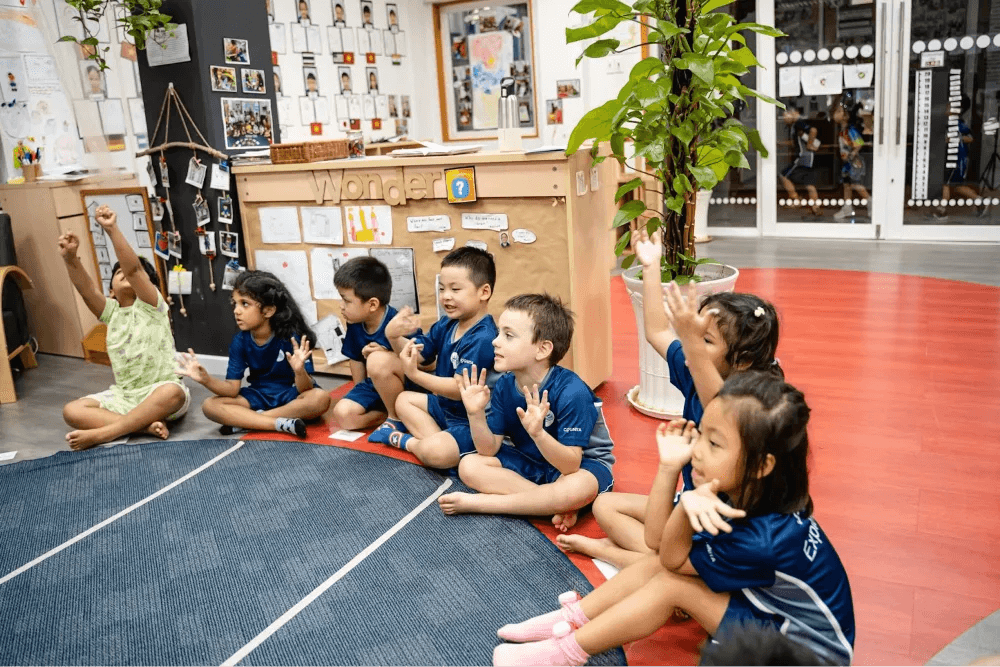
How to Apply Distance and Blended Learning
- Combine Online and In-Person Activities: Structure lessons into online and face-to-face components. For instance, online resources can be used for independent activities and group discussions, while in-person sessions can be reserved for collaborative projects and hands-on learning.
7. STEM/STEAM Education
STEM (Science, Technology, Engineering, and Mathematics) and STEAM (adding Arts to STEM) are key trends in early childhood education that stimulate critical thinking, creativity, and problem-solving skills from a young age.

Benefits of STEM/STEAM Education
- Enhanced Problem-Solving Skills: STEM/STEAM activities encourage children to think critically and solve complex problems through experimentation and hands-on learning
- Building Resilience: Engaging in STEM/STEAM projects often involves trial and error, which helps children develop resilience and perseverance as they learn to overcome challenges and refine their approaches.

How to Apply STEM/STEAM Education
- Link to Real-World Contexts: Relate STEM/STEAM activities to real-life scenarios, such as observing natural phenomena or solving everyday problems. This helps children understand the relevance of STEM/STEAM concepts in their daily lives.
ISHCMC provides the International Baccalaureate Primary Years Programme (IB PYP) that aligns seamlessly with the contemporary educational trends above:`
- Social-Emotional Learning (SEL): The IB PYP’s focus on developing the whole child is supported by SEL practices, which nurture students’ emotional intelligence and interpersonal skills.
- Inquiry-Based Learning: The inquiry-based approach of the IB PYP is complemented by game-based learning strategies, which engage students through interactive, experiential activities.
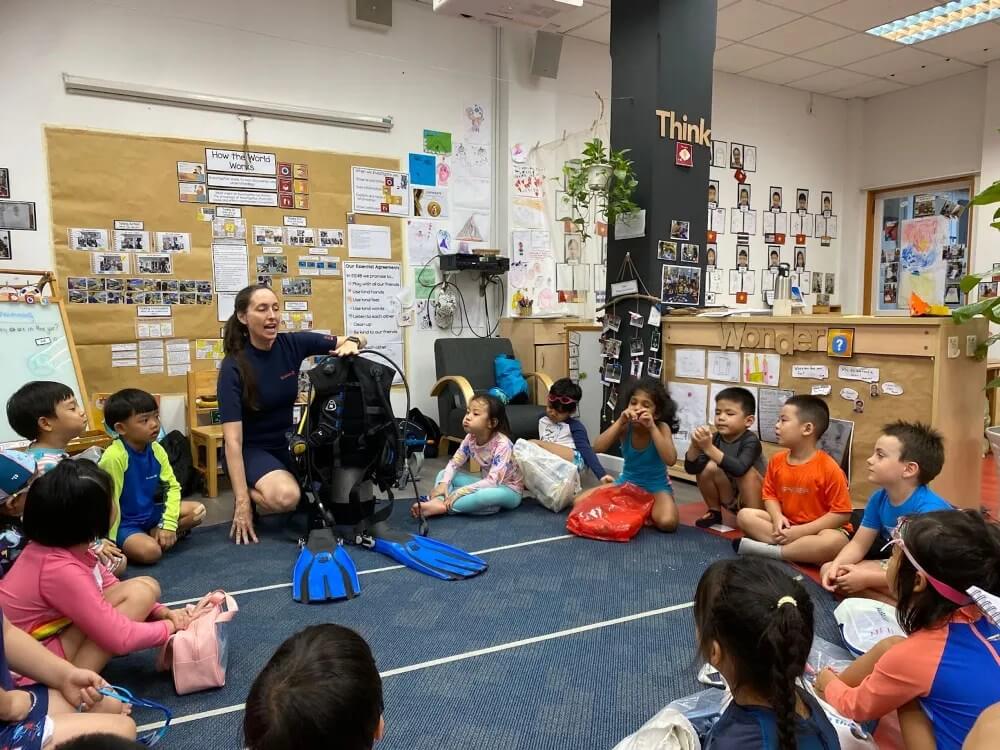
- AI and Technology Integration: The IB PYP leverages technology to enhance learning. Our inquiry-based approach incorporates digital tools and resources.
- Distance and Blended Learning: These modern learning modalities support the PYP’s goal of making learning relevant and accessible, providing flexible and diverse educational experiences.
- STEM/STEAM Education: The IB PYP’s curriculum fosters inquiry and exploration, which aligns with STEM/STEAM education’s emphasis on developing critical thinking and creativity.
Through its inquiry-based and conceptually driven approach, the IB PYP of ISHCMC effectively supports these trends, creating a comprehensive educational framework that prepares students for future success in a rapidly evolving world.
Choose ISHCMC’s Primary & Secondary School For Your Child’s Development!
At ISHCMC, we are dedicated to providing an exceptional education that embraces the latest trends in early childhood education. Our Primary and Secondary School programs are designed to develop well-rounded, engaged, and empowered learners through innovative and inquiry-based approaches.
Apply today to join our vibrant educational community and take the first step toward enriching your child’s learning and growth!
Reference:
- Loeb, S., & Bassok, D. (2016). Early childhood and the achievement gap. Early Childhood Research Quarterly, 36, 10-22. https://doi.org/10.1016/j.ecresq.2015.12.023
- Schlesinger, M. A., & Cervera, J. J. (2019). Parental involvement and academic performance: A quantitative study. Frontiers in Psychology, 10, 305. https://doi.org/10.3389/fpsyg.2019.00305
- Burke, N. N., & Loo, L. S. (2018). Nature contact and psychological well-being. JAMA Network Open, 1(6), e185727. https://doi.org/10.1001/jamanetworkopen.2018.5727
- Lee, S., & Ginsburg, K. R. (2019). The importance of play in promoting healthy child development. Early Education and Development, 31(1), 1-17. https://doi.org/10.1080/10409289.2018.1539557

